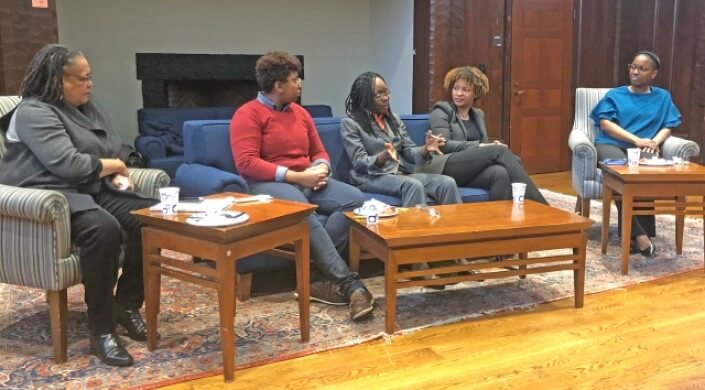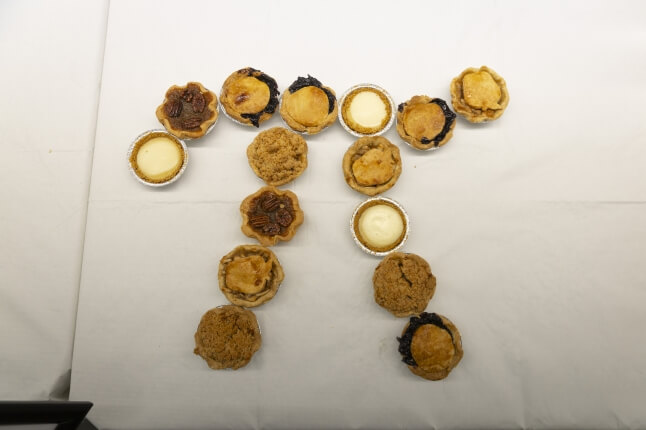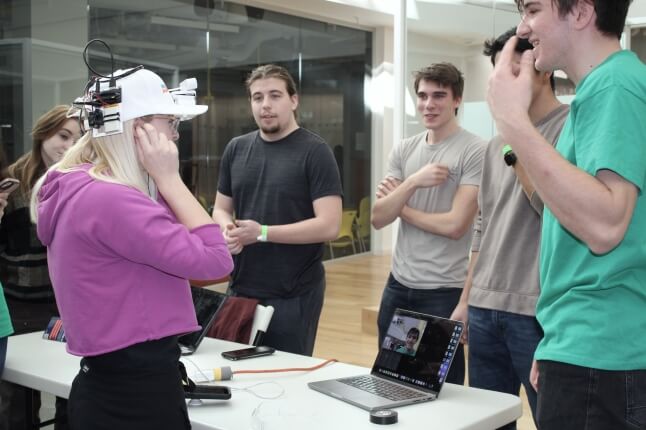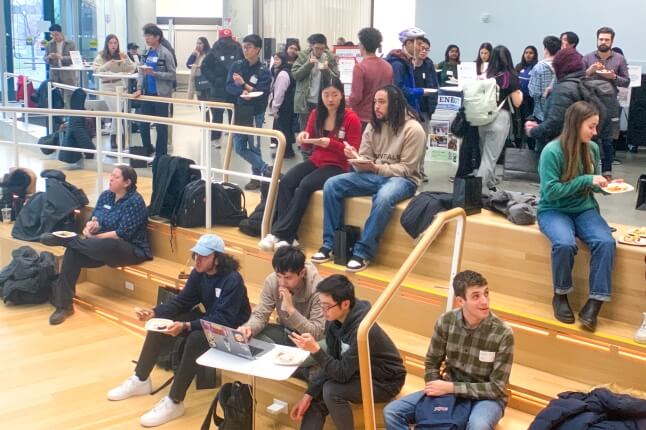News
Black Women in STEM panelists (from left) Evelyn Hammonds, Kiera Hudson, Paulette Chandler, Lindsay Nuon, and Makendra Umstead discuss what motived them to pursue careers in engineering and the sciences. (Photo by Alana Davitt/SEAS Communications.)
What do the chair of Harvard’s History of Science Department, a cancer biologist, a physician in internal medicine, a doctoral student in psychology, and an information security specialist have in common? Evelyn Hammonds, Makendra Umstead, Paulette Chandler, Kiera Hudson, and Lindsay Nuon, respectively, are all professional black women in STEM.
They comprised the panel at the Black Women in Science and Engineering brunch on Feb. 24, hosted by the student chapter of the National Society of Black Engineers (NSBE). Board member Augusta Uwamanzu-Nna, S.B. ’20, a bioengineering concentrator at the John A. Paulson School of Engineering and Applied Sciences (SEAS), moderated the event and opened by articulating the rationale for a NSBE chapter at Harvard.
“We are a group that is not highly visible in our field. Seeing people who look like you doing what you want to do is very inspiring,” she said.
Questions centered around the speakers’ professional experience, with topics including: what motivated them to pursue careers in engineering and the sciences, did they ever feel discouraged in pursing their dreams, and how their shared identity as women of color supported them through their pursuits.
The youngest panelist, Kiera Hudson, a fourth-year doctoral student in social psychology at Harvard focusing on the origins and intersections of hierarchy, shared her unsteady transition from college to pursuing research and a Ph.D. She delayed applying to graduate school after being told she didn’t have the credentials.
“I knew what I was capable of, but I didn’t know how to prove it to other people,” she said.
Hudson encouraged students to seek many mentors and opinions and to never be held back from pursuing passions.
Umstead, who recently earned her Ph.D. graduate in cancer biology and now works as part of the Pfizer Immuno-Oncology Alliance for pharmaceutical company Merck, talked about the diversity of fields within STEM that many never discover.
“You can do so much with a STEM background, and I don’t think as a college student I appreciated that,” she said. “Things like scientific writing, business, government regulation, and policy. There are ways to combine the things you love.”
Chandler, an associate physician at Brigham and Women’s Hospital and a clinical instructor at Harvard Medical School, spoke on one downside to the broadness of STEM.
“My biggest barrier was having too many interests. I would take on seven courses and then struggle to choose which ones to drop,” she said.
Having good mentors kept her pointed in the right direction, she said, and family members’ struggles with disease kept her motivated to learn about preventative measures.
Nuon, who started her career in the military and government agencies and has now made the transition to cyber security startups, spoke of having to be “creative and tenacious when people would tell me I’m not qualified.”
She explained she had never experienced a moment that swayed her away from her field because she grows more during the tough times.
“Optimize the no’s. Dissect them,” she advised the audience.
This is the type of attitude that Hammonds has carried with her throughout her life. She started her academic career in electrical engineering and physics, but transitioned to history of science because she “wanted to understand the underrepresentation of black people in STEM, to debunk the opinion that black people can’t do science.”
Hammonds shared a story about her time as the only black female electrical engineering student at Georgia Tech, where she pursued a joint degree as an undergrad at Spellman College. Upon receiving her first test grade, she and the few black men in the course had scored the worst. Instead of being discouraged, she grew determined to find the cause of this disparity, knowing it was not her own lack of preparation or understanding. She soon discovered the white students had amassed an exam bank of old test questions and had all the right materials for studying. While some of the minority students dropped out of the class, Hammonds studied with those who had access to the information and thrived.
“While most backed off with the bad grade, the stereotype threat, I learned to analyze, to ask what is going on, to connect across race, gender, and sexuality,” she explained. “I learned to be in the community of students I’m amongst. Be in it. Because we’re all committed to the same things. I just need to make my voice a part of that community.”
The panelists’ deeply personal stories, and trailblazing accomplishments, resonated with the students in attendance.
“These stories overwhelmed me, seeing how everyone here has paved a different path and identity even within their larger identity as black women in science and engineering,” said Uwamanzu-Nna. “I’m excited for my own future—to be doing something unique and paving my own way for others to follow.”
Topics: Diversity / Inclusion, Events
Cutting-edge science delivered direct to your inbox.
Join the Harvard SEAS mailing list.
Press Contact
Adam Zewe | 617-496-5878 | azewe@seas.harvard.edu



